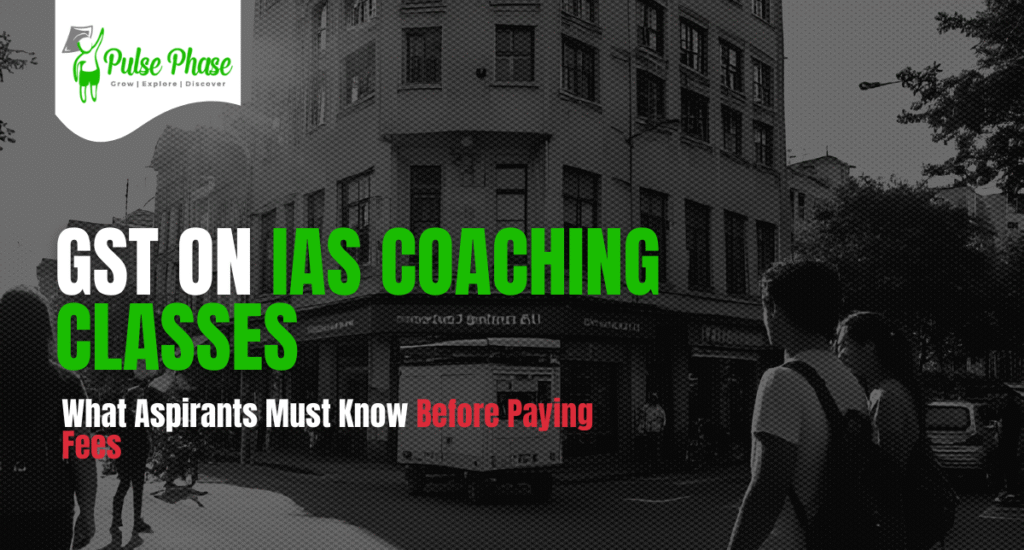Lakhs of students from all over India prepare for the UPSC civil services exam each year, and almost every one of them enrolls for IAS coaching. There are coaching centers with guides, study material, and test series to help them prepare well. But now students also need to pay attention to the GST on IAS coaching classes 2025. The Goods and Services Tax (GST) impacts the fees payable by aspirants.
The government had, in 2017, brought coaching services under the tax net when it unveiled the GST. Since then, students opting for IAS coaching have had to pay GST on top of the base course fee. Given that coaching fees are already high, this tax places a huge extra burden on those who aspire to study and their families. In this article, we will discuss everything you need to know about GST on IAS coaching classes, GST rates, and its effect on IAS aspirants.
GST on Coaching Classes in India – Latest Updates
The government is still charging GST on IAS coaching classes in India. The GST Council has stated that coaching institutes – whether IAS, IIT-JEE, NEET, coaching, or test series – are considered “commercial training and coaching,” and therefore, must charge GST on whatever fees they charge students.
- The present rate of GST charged on coaching services is 18%.
- This is true for all services, including offline and online classes, test series, crash courses, and doubt-clearing classes.
- The Union Budget 2025 did not change the rate, so the students are still paying far higher fees than before GST was introduced.
Aspirants need to understand that GST on IAS coaching classes is not voluntary. Coaching centers have to collect and pay GST if their total fees exceed the GST registration threshold. Therefore, aspirants must consider the amount of tax when they are selecting institutes.
Is GST Applicable on IAS Coaching Fees?
Yes, GST will apply to the IAS coaching fee. While schools and universities provide recognized degree programs and remain exempt, IAS coaching centers do not meet that exemption.
Institutes charge 18% GST on the course fee amount. For example, if the fee is ₹1,00,000, the student ends up having to pay ₹1,18,000 with GST. Students need to remain aware that GST will be applicable without consideration of where the institute is located or how it teaches. Whether aspirants are joining in Delhi, Hyderabad, or through an online learning platform, they will still pay the same rate of GST.
Current GST Rate on IAS Coaching Classes
The GST on IAS coaching classes was fixed by the government at 18% for all institutes, online and offline, for every type of training service relating to competitive examination preparation.
| Service Type | GST Applicability | GST Rate |
| IAS Coaching (Offline) | Applicable | 18% |
| IAS Coaching (Online) | Applicable | 18% |
| Test Series/Crash courses | Applicable | 18% |
| Mock Interviews & Workshops | Applicable | 18% |
This table summarizes the services covered by GST applicable to IAS coaching. Students have to pay GST along with the base fee that the institute charges them.
How GST Affects the Total Fees for IAS Aspirants?
The 18% GST on coaching fees is a hefty addition to the total fees that an IAS aspirant has to pay. Coaching already costs a lot of money, with the civil services exam being expensive on its own. When you add the 18% GST to the base fee, it adds a considerable amount to the total cost.
For example, if a student pays Rs. 1,50,000 for a one-year foundation course, an extra Rs. 27,000 will be added. The aspirant will then be paying Rs. 1,77,000. The extra Rs. 27,000 could be a large financial burden for many students and families, as each student and family will have a different financial situation.
Why Coaching Institutes Charge 18% GST on Fees?
Coaching institutes are required to charge 18% GST on their fees because the government recognizes coaching institutes as commercial business entities providing training services. Coaching institutes do not qualify for the exemption for institutions of learning that grant formal degrees or diplomas recognized by law.
Are Online IAS Coaching Classes Also Under GST?
GST is also applicable to online IAS coaching classes. The government considers digital courses, video lectures, and test series as a commercial service. This requires the coaching institute to collect 18% GST on the course fee.
For example, if the online course is priced at ₹50,000, the student must pay 18% GST on that price, therefore an extra ₹9,000 GST. Therefore, the total for the online course would be ₹59,000.
Can Students Claim GST Input Tax Credit on Coaching?
Students are not able to claim GST Input Tax Credit (ITC) on any coaching fee. The ITC benefit will apply only to those businesses that provide services for a fee and are using that service for revenue-generating purposes. Students are paying fees to study for themselves and not for revenue purposes; therefore, they can’t use the ITC to lessen their tax burden.
Coaching institutes can claim ITC on their purchases, such as rent, electricity, or purchasing study material etc. Students will pay the full GST costs.
| Payer | ITC Eligibility | Reason |
| Coaching Institute | Eligible | Uses inputs for Business Activities |
| Student | Not Eligible | Pay fees for personal education |
GST on Education Services 2025: What Changed in the latest Budget?
How the New GST Rules Impact IAS Aspirants’ Budget?
This extra cost in the form of GST could be something that many aspirants will forget or leave out when budgeting, leading to financial stress later. The table below shows the impact of GST on total Fees payable.
| Base Fee | GST @ 18% | Total Payable |
| ₹100000 | ₹18000 | ₹118000 |
| ₹150000 | ₹27000 | ₹177000 |
| ₹200000 | ₹36000 | ₹236000 |
Comparison – Coaching Fees Before and After GST
The introduction of the Goods and Services Tax (GST) in 2017 changed the cost structure of coaching classes. Before GST, aspirants were required to pay service tax (15%). The government then fixed GST at 18%, increasing the burden further.
| Period | Tax Rate | Example Fee (100000) | Total Payable |
| Before GST (Service Tax+Cess) | 15% | 100000+15000 | 115000 |
| After GST (From 2017) | 18% | 100000+18000 | 118000 |
FAQs on GST for IAS Coaching Classes in 2025
1. Are IAS coaching fees subject to GST?
Yes, aspirants are expected to pay 18% GST on coaching fees.
2. What is the GST for IAS coaching in 2025?
The GST is 18 %.
3. Do online IAS coaching classes also attract GST?
Yes, GST applies to both online and offline coaching.
4. Can students claim GST Input Tax Credit on fees?
No, students cannot claim ITC.
5. Why do institutes charge GST separately?
The law requires institutions to collect GST from students.
6. Does GST apply to test series and study material?
If the institute is charging for them separately, yes.
7. Do government-run IAS training centers charge GST?
No, only private commercial institutes fall under GST.
8. Has the GST Council reduced the rate for IAS coaching?
No, the rate is still 18%.
9. Are small coaching centers taxable under GST too?
Yes. Small coaching institutes must charge GST on their services if they cross the annual threshold limit of ₹20 lakh.
10. How much should students expect in addition because of the GST?
Aspirants must take 18% of the base fee and calculate the applicable total amount payable
Conclusion
Understanding the impact of GST on IAS coaching classes is essential for every aspirant. With the government levying 18% GST on coaching fees, the cost of preparation has increased significantly. For many students, this added financial burden comes on top of already high living expenses, study materials, and travel costs, making the IAS journey more demanding than ever.
While the introduction of GST has streamlined India’s taxation system and brought greater transparency, its effect on the education sector—particularly in the case of competitive exam coaching—cannot be overlooked. The higher fee structure may discourage some talented aspirants from accessing quality coaching, thereby raising concerns about affordability and inclusivity.
For students, being aware of the GST rates applicable to coaching institutes is crucial. By planning finances wisely, exploring scholarships, or considering alternative learning platforms, aspirants can reduce the strain of these additional costs. Ultimately, despite the burden of GST, the focus must remain on disciplined preparation, smart strategy, and perseverance—qualities that define the journey to success in the civil services examination.
READ MORE ABOUT: Current Affairs

